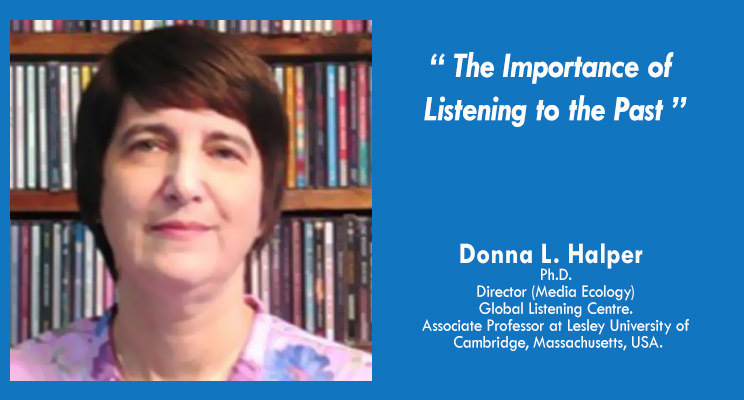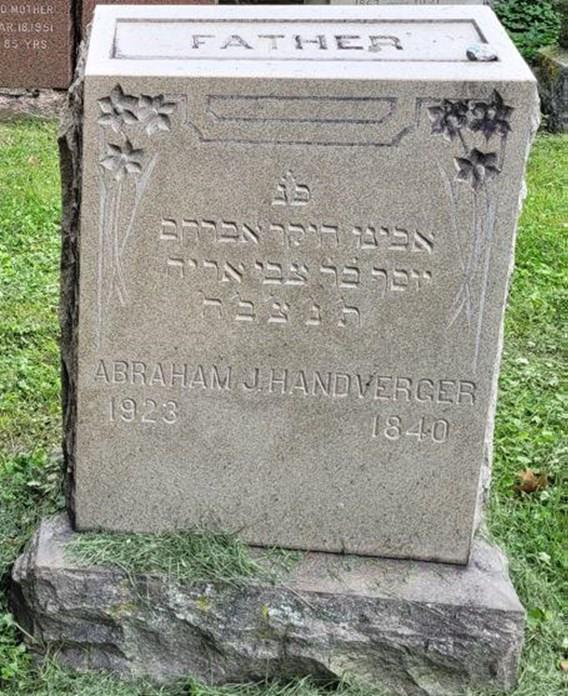
The Importance of Listening to the Past
Donna L. Halper, Ph.D.
Director (Media Ecology)
Global Listening Centre.
Associate Professor at Lesley University of
Cambridge, Massachusetts, USA.
 A few weeks ago, I received an interesting lesson about listening. It happened in an unexpected place: an old graveyard, in an out-of-the-way part of Boston, the city where I live. What I learned was something I had always known in theory; but standing among the old gravestones, it became much more real to me.
A few weeks ago, I received an interesting lesson about listening. It happened in an unexpected place: an old graveyard, in an out-of-the-way part of Boston, the city where I live. What I learned was something I had always known in theory; but standing among the old gravestones, it became much more real to me.
I understood more deeply why listening to our relatives’ stories is so important—even the stories we’ve heard before, or the stories that don’t seem consequential at the time. But listening to those stories matters. The person reminding me of this lesson was a man I had never met before: my maternal great-great-grandfather.
His name was Abraham Joseph Handverger, and he died in early February 1923. Since I wasn’t born until 1947, I never actually met him in person. In fact, until a few months ago, I had no idea he even existed. When I was growing up, my maternal grandfather Samuel was still alive, but I never met my maternal grandmother, Dora-she died before I was born. I also never met my great grandfather Elias, nor my great grandmother Bessie. As for the people from the generations before them, I did-n’t even know their names.
In 2018, I was doing some genealogical research, but unlike most people who use sites like Ancestry.com, I wasn’t creating a family tree. I’m a professor, a free-lance writer, and a media historian, and when I use a genealogy site, I am usually seeking further information on the early years of certain entertainers, athletes, or politicians—whoever I’m researching (and writing about) at the time.
One night, out of curiosity, I typed in the name of my mother. I wondered what information about her might have been preserved. As it turned out, there were a few documents I had never seen, and that led me to type in a few other family names. That is how I unexpectedly discovered one more generation of my relatives and began learning more about them.
In the Jewish religion, there is a custom of visiting the graves of our deceased family members during the Hebrew month of Elul (which usually comes in September). Having suddenly found that I had a great-great-grandfather named Abraham who was buried in Massachusetts, I became determined to visit his grave and pay my respects. That led me to an old graveyard, one that is seldom visited, where some of the gravestones are more than 135 years old. The gravestones were in various conditions: some had survived beautifully, while others had fallen, and others were so faded with age that they were barely readable.
I had no idea where my great-great grandfather’s grave was, and nothing was clearly marked, so I walked among the gravestones, looking for his name. I did not find the grave on my first visit, nor on my second, nor even on my third. I was beginning to think it was a hopeless situation. But then, a col-league, who is familiar with that cemetery, was able to locate the grave, and he told me where it was. I was profoundly grateful.
Now, I was finally able to see where my great-great-grandfather had been laid to rest nearly a century ago. The terrain was hilly, but I climbed to the row where his gravesite was, and I stood before his grave to offer my prayers for his soul. And when I had finished, I placed a stone on the grave marker, another Jewish custom, to let the next visitor know that someone has been there, a sign that the departed have not been forgotten.
As I stood there, thinking about Abraham Handverger, a man I knew so little about, I also wondered about some of the others whose names I saw. There were some who died in infancy or early childhood, and others who lived into their eighties. Some had names reminiscent of “the old country,” while others had names that could have belonged to anyone in Boston. The longer I stood there, the more I began to wonder about what kind of lives these people had led.
And I wondered what it was like being an immigrant from Russia or Lithuania or Romania or Poland, arriving in Boston in the 1880s, not speaking the language, not belonging to the dominant religion, not familiar with the dominant culture. I wondered what my great-great-grandfather thought of America, and why he chose to settle in a rural community, more than an hour from the big city, where he and his wife Eva raised nine children. There is so much I will never know about them, but I found myself wishing that I could tell their stories.
As I said my goodbye to the cemetery where I had spent several hours, I gave one last look back at some of the old gravestones, and I wondered if any of the people at rest there had anyone left to remember them—were there living relatives who came by to pay their respects? In the four times I visited, I only saw one other person. During their lives, these people mattered to someone; they were loved, they were important. And today, it seems that many of them are forgotten. Although I suppose that this is just part of life, it still made me sad.
I often give presentations about media history. I speak about old radio shows or popular TV personalities. I’ve got a large collection of rare photos and memorabilia, and before the COVID-19 pandemic, I would go to libraries or amateur radio clubs or civic organizations and give my talks in person. These days, I give them on Zoom, but the reaction is usually the same: people love to reminisce, and they love to remember the songs, the programs, and the announcers they grew up with.
I am increasingly asked to give my presentations for residents of assisted living facilities, many of whom are in their 80s and 90s; when I’m done with my talks, the attendees often want to chat about “the good old days,” and I’m happy to do it. After all, they have firsthand experience with what life was like during the Great Depression of the 1930s, and they lived through
World War II. I find their perspectives extremely valuable. They knew some of the people that I have only read about. Often, they also tell me about their own lives—with stories about what it was like having a husband or brother fighting overseas, or how much their favorite radio drama provided an escape and helped them get through difficult times. And whenever I can, I try to take some notes about their recollections, because the stories help me to understand life in an era long before I was born.
I realize that for some people, listening to an older relative telling a story that has been told many times isn’t very exciting. But sometimes, it’s not about the story. It’s about letting the person know you are willing to listen— that their experiences and their recollections still matter…that they themselves are still important and worth listening to. If I had ever met my great-great-grandfather Abraham in person, I would have wanted to hear about the old country, but I also would have wanted to know how he and my great-great-grandmother Bessie adapted to America, what challenges they encountered and how they dealt with them, what their hopes and dreams were, and so much more. I can only imagine the stories they had, stories I will never hear.
That’s why I wanted to share my experience with you, and the reminder I received about the importance of listening. So, if you have older relatives, take the time to listen to them while you still can. Let them tell their stories, even if you’ve heard them before; learn about how they lived, so that when they are no longer here, you can be the repository of some of their favorite memories and tell their stories to others. In a way, that helps to keep your relatives alive; it helps to keep them from being forgotten.
I’ve learned a lot from some of the stories I’ve heard: stories of disappointment, stories of resilience, stories of faith. I wish I could tell the stories of some of the people whose gravestones I saw. But that’s probably impossible. On the other hand, what is possible is learning from those people who are still with us and letting them know we do have the time to listen. While a lot of our lives are spent focused on the present and the future, sometimes it’s a worthwhile experience to make some time to listen to—and learn from—the past.
